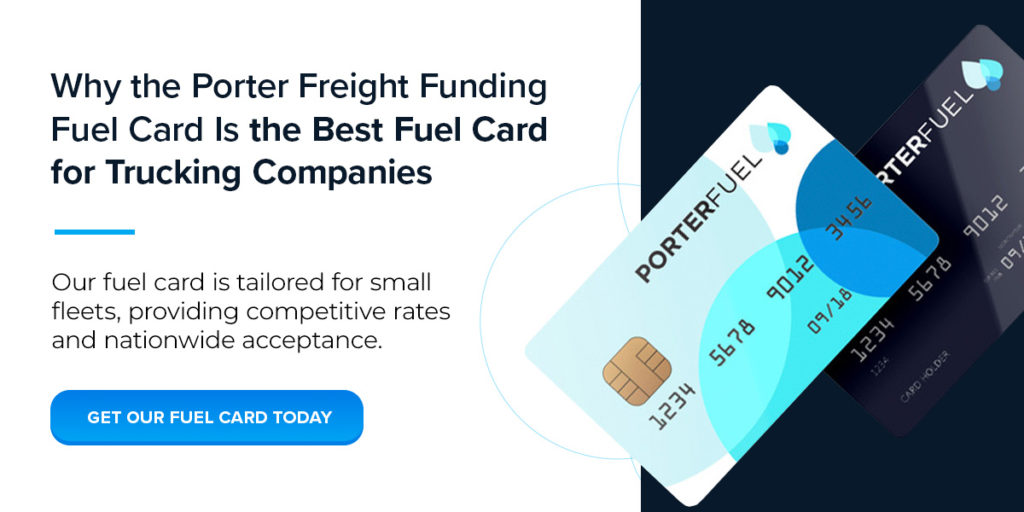Fuel costs are a critical operational expense for trucking companies and can significantly impact profit margins and overall business sustainability. However, fuel prices are quite volatile, with unpredictable fluctuations impacting budgets and financial planning for many fleets.
Jump To Section
Understanding how to manage rising fuel costs is essential for profitability and competitiveness. By implementing smart fuel management practices, carriers can combat rising fuel costs and ensure long-term sustainability in an ever-changing market.
This guide explores the complexities of fuel price volatility and offers practical strategies for trucking companies to navigate these challenges effectively.
Understanding Fuel Price Volatility
To effectively manage rising fuel costs, you must understand the factors driving price volatility. Retail fuel prices are impacted by crude oil costs and the amount of gasoline available worldwide, which have always been influenced by a complex interplay of global and local factors.
Geopolitical Events
International conflicts, trade disputes and political instability in oil-producing regions can lead to sudden supply disruptions and price spikes. These events often have far-reaching consequences, affecting fuel prices across the globe and creating challenges for trucking companies trying to navigate fluctuating fuel prices.
Economic Conditions
Global economic growth or recession affects fuel demand, influencing prices. Economic downturns often lead to decreased demand and lower prices, while periods of growth can drive prices up. The relationship between economic health and fuel prices is complex, with various factors like industrial production, consumer spending and overall gross domestic product (GDP) growth all playing a role.
Supply and Demand Dynamics
Changes in oil production levels, refinery capacity and consumer behavior all impact the balance between supply and demand, causing price fluctuations. The decisions of the Organization of the Petroleum Exporting Countries (OPEC) also significantly influence supply and demand, governing how much oil is produced and the cost of crude oil. New oil discoveries and shifts in energy consumption patterns can also contribute to the balance of supply and demand.
Natural Disasters
Hurricanes, earthquakes and other natural events can disrupt fuel production and distribution, leading to temporary price increases. These events are particularly impactful when they affect major oil-producing regions or critical infrastructure such as refineries and pipelines.
Regulatory Changes and Environmental Policies
Stricter emissions standards and the push for cleaner fuels can impact production costs and availability. For instance, the transition to ultra-low sulfur diesel (ULSD) in the United States led to price increases due to higher production costs. Carbon taxes and other environmental regulations can directly affect fuel prices, creating additional challenges for trucking companies trying to fight rising fuel prices.
How to Navigate Fluctuating Fuel Prices
As fuel prices fluctuate, trucking companies must adopt strategic approaches to manage costs effectively. Here are some of the most effective ways carriers can combat fuel costs and save money on fuel:
Use Fuel Cards
Fuel cards are powerful tools for trucking companies to maximize fuel cost savings. Unlike credit cards, fuel cards offer specific spend limits that can stop transactions or shut off pumps once limits are reached.

Key advantages of fuel cards include:
- Access to lower base fuel prices: Fuel card providers partner with truck stops nationwide to offer competitive low base fuel rates, regardless of market fluctuations. The savings can be substantial, especially for small fleets without the negotiating power to secure favorable fuel rates on their own.
- Real-time tracking and reporting: Fuel cards allow companies to monitor fuel purchases in detail, helping them identify trends and optimize fuel management strategies.
- Fraud prevention: With their built-in security features, fuel cards reduce the risk of unauthorized purchases and fuel theft. This protection is particularly valuable for small fleet operators who may not have extensive internal controls in place.
- Customizable spending controls: Companies can set limits on fuel purchases, restrict fueling locations and manage driver spending more effectively. These controls provide a level of oversight that is difficult to achieve with traditional payment methods.
- Streamlined accounting: Fuel cards simplify expense tracking and reconciliation, saving time and reducing administrative costs.
Shop for the Lowest Overall Price Not the Highest Discount
Many carriers make the mistake of “shopping the discount” versus shopping the lowest price. In today’s environment many of the larger truck stop chains are offering larger discounts; however, their base price points tend to be, on average, $0.30 per gallon higher at their starting point. So, if they are offering a $0.25 per gallon discount, they tend to still be higher than many of the smaller Mom and Pop chains/stations.
If a Mom and Pop station is offering a $0.10 discount per gallon, the majority of the time, this gallon will be cheaper nearly every time. Using the PorterFuel card can provide you with benchmarking tools, allowing you to access your fleet’s fuel history and how well you’re purchasing against the market.
Plan Your Routes Early
Don’t wait to start searching for fuel until your tanks get down to a certain level; it might just be too late. For example, on a run from Dallas to Chicago, the fuel purchased in Oklahoma and/or Missouri will always be cheaper than fuel purchased in Indiana or Illinois most commonly due to taxes. However, even taking taxes out of the equation, the price per gallon will be cheaper.
The best advice is to check the entire route before leaving the yard. The best practice is to take on the most gallons at the cheapest price per gallon as possible. Porter Freight Funding offers tools allowing all users to find the best fuel price along their routes quickly and efficiently.
Bulk Fuel Purchasing
Bulk fuel purchasing is an effective way to fight rising fuel prices. It involves buying large quantities of fuel at a fixed price, often through futures contracts or agreements with suppliers. Bulk purchasing offers several advantages for trucking companies looking to manage rising fuel costs.
- Price stability: By locking in fuel prices for an extended period, companies can protect themselves against short-term price fluctuations. Price stability allows for more accurate budgeting and financial planning, helping to ensure profitability.
- Volume discounts: Bulk purchasing often comes with volume discounts, allowing companies to secure better rates and reduce overall fuel costs, even if prices fluctuate.
- Improved budgeting: With known fuel costs, companies can accurately forecast expenses and plan their operations.
- Reduced supply chain risks: A dedicated fuel supply can help mitigate the impact of temporary shortages or distribution issues, ensuring operations can continue smoothly even during market disruptions.
Regular Vehicle Maintenance
Proper vehicle maintenance is crucial for trucking companies to save money and fight rising fuel costs. Well-maintained trucks consume less fuel, reducing expenses and helping trucking companies save money on fuel. Best maintenance practices include:
- Regular oil changes: Clean oil reduces engine friction, improving fuel economy.
- Proper tire inflation: Underinflated tires increase rolling resistance, leading to higher fuel consumption. Regular tire pressure checks and adjustments can lead to significant fuel savings.
- Air filter replacement: Clean air filters improve engine performance and fuel efficiency by ensuring optimal airflow to the engine.
- Engine tuning: Regular tune-ups ensure all engine components function correctly, impacting fuel economy.
- Aerodynamic improvements: Installing aerodynamic devices like side skirts and roof fairings can significantly reduce fuel consumption, especially for long-haul operations.
Optimize Driving Routes
Leveraging technology to optimize driving routes is an effective way to save money on fuel trucking. Modern routing software can help companies:
- Plan fuel-efficient routes: Avoid congested areas, steep grades and unnecessary detours to minimize fuel consumption.
- Reduce idle time: Efficient routing can decrease time spent in traffic, reducing fuel waste and engine wear and tear from idling.
- Coordinate fuel stops: Plan refueling at locations offering the best prices along the route to take advantage of price differentials and minimize fuel costs.
- Monitor driver behavior: Track speed, acceleration and braking patterns to identify areas for improvement in fuel efficiency.
- Real-time adjustments: Respond quickly to traffic conditions or weather events, rerouting vehicles to maintain optimal fuel efficiency.
Why the Porter Freight Funding Fuel Card Is the Best Fuel Card for Trucking Companies
Navigating fuel price volatility is crucial for the success of any trucking company. There are many ways to save money on fuel trucking and manage rising fuel costs, with fuel cards standing out as a powerful tool. They offer consistently lower fuel prices, spending controls and valuable insights into fuel consumption patterns.
At Porter Freight Funding, our fuel card is tailored for small fleets, providing competitive rates and nationwide acceptance. Don’t let fluctuating fuel prices impact your bottom line. Get our fuel card today and maximize your savings.




